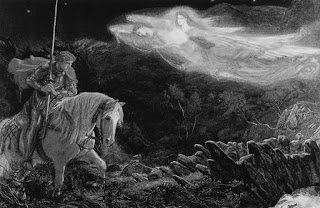American Grael Quest: Poe’s “Eldorado”
 |
| Sir Galahad - the Quest of the Holy Grail, 1870 by Arthur Hughes. |
“Eldorado” (1848) is Poe’s take on the classical grail quest—California Gold Rush edition—with a touch of swan song, to boot. The “gallant knight” is practically a lost Templar from Medieval Christendom and, as in the classic grail romance, he is traversing a vast expanse that has been laid waste—a wasteland. And the destiny he seeks is not an actual place, but a spiritual state of realization, a way to escape the false existence of the wasteland by finding the ultimate spiritual fulfilment.
At the same time, the poem tracks the themes found in other Poe poems, namely the idea of a gilded childhood, and a happiness lost in adulthood, followed by a melancholic longing to recover that “joy departed.” In the first stanza, our Knight is “Gaily bedight”—he is cheerfully attired, we can imagine him sporting bright colors and chic fashions as he goes forth, “Singing a song.” But, by the second stanza, “a shadow” falls over his heart as he finds failure in his search. By the third stanza, “his strength/Fail[s] him at length” and he is indeed crestfallen.
We see the same motif elsewhere in Poe’s poetry:
In visions of the
dark night
I have dreamed of joy departed—
But a waking dream
of life and light
Hath left me
broken-hearted.
This “joy departed” points
invariably to a now remote—and dreamy—youth or childhood:
For I have revell’d
when the sun was bright
I’ the summer sky,
in dreams of living light,
And loveliness …
“Eldorado” was written near the
end of Poe’s life, so it is inevitable that we must think he is surveying his
own life and collapsing alongside the exhausted grail seeker: “Mute,
motionless, aghast!” (“To
One In Paradise,” 1833.) Poe’s wife,
Virginia, had died the previous year, so it is easy to imagine that Poe sees
his life as a wasteland. In “The
Raven” (1845), Poe describes his slice of the world as “this home by
horror haunted” set upon “this desert land enchanted.”
Then our Knight encounters “a
pilgrim shadow.” Again, the action tracks the classic legend, which was
summarized by Joseph Campbell in "The Power of Myth:"
The Grail King ... was a lovely young man, but he had
not earned the position of Grail King. He rode forth from his castle with the
war cry “Amor!” Well, that’s proper for youth, but it doesn’t belong to the
guardianship of the Grail. And as he’s riding forth, a Muslim, a pagan knight,
comes out of the woods ... What that means is ... the Christian separation of
matter and spirit, of the dynamism of life and the realm of the spirit, of
natural grace and supernatural grace ...
Whether “singing a song” or
crying out “Amor!” (“Love!”), the happy Knight meets his counterpart, which
in Poe’s adaptation, is actually a “shadow,” the universal companion. Some have interpreted Poe’s “pilgrim shadow”
as a ghost, or even the personification of Death, but I think there is an
intended connection between the “Shade” and the Knight, as the term “shadow”
implies. The device is reminiscent of
Psyche in “Ulalume” (1847), who is described as the narrator’s “soul.”
Consulted on how to find the destination
the Knight is seeking, the Shadow gives an enigmatic answer. Some have
interpreted the response as saying that Eldorado is not to be found—the Shadow’s
equivalent of “Nevermore.” The Shadow
tells the Knight to go over the Mountains of the Moon—the legendary source of
the holy river Nile, and down to the Valley of the Shadow, the vale of Death,
as it were; to travel from the beginning to the end; in essence, to go on searching throughout all eternity.
Yet the Shadow’s instruction is
inherently ambivalent, much like the grail seekers’ charge to enter the forest “wherever
they saw that it was thickest.” An alternate reading of the Shadow’s command is
that the quest is the destination: that to be realized and to be in the
ultimate ground of being, the Knight simply needs to “Ride, boldly ride.”
A final symbolism is that Eldorado
is akin to the legendary Fountain of Youth, also sought by the Spanish
conquistadors who sought El Dorado, and Poe’s Psyche is telling him what he inherently already knows: that to recover his youthful steam in his stride, he needs to be
more like the “gallant knight” of his former years, who goes forth “singing a
song” in search of something he may never acquire, yet his seeking it is what
gives his life meaning and prevents it from being a wasteland.
“Ride, boldly
ride,”
The shade replied,—
“If you seek for
Eldorado!”




Comments
Post a Comment